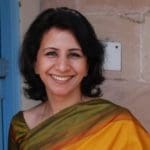Ms. Anjali Anand Seth

“So what’s your story?”, I smiled and asked.
They all looked at each other in confusion. Some even shrugged their shoulders, not sure how to respond.
One raised her hand, with doubt written on her face. She asked, “Is it important that everyone has a story? What if it is not interesting?”
Good question indeed I thought to myself.
I smiled, again, “Yes, everyone has a story and whether the story is interesting or not, depends on how it is narrated. So let me begin again with my introduction. My name is Anjali Anand Seth and I am your new Social Science teacher. I will help you understand (not teach) History and Political Science syllabus by telling you one story everyday – His and Her Story – to facilitate you to understand your life as it unfolds today and tomorrow, until your own life becomes your story.”
They all looked amazed, with rapt attention. I knew we had just written the introductory chapter of our long story together – at least for this academic year. Welcome to my journey as an educator…
The thought of becoming an educator was probably planted when I was a student myself. I knew what kind of a teacher I DID NOT wish to become. Those boring classes, routine work and rote learning could never excite me to go to school. So when I got an opportunity to teach, I knew what I would not do.
Reinventing myself for every grade – from class 2 to 12 – I taught them all. To make the theme was made interesting I started weaving stories around the subjects I taught. I became a storyteller of the Solar system to the Mughals, from Gandhi to Hitler, from clothing to cricket, and even how butter chicken was an amalgamation of different cultures! The students remembered the lessons well as they heard the narration with interest. We discussed the versions to build our own conclusion and this led to two-way knowledge transfer. We all agreed to disagree by communicating our opinions, thereby adding a unique element to this style of learning. Our classroom definitely transformed to a liberated learning space for forty minutes daily.
Sadly, our schools often do not encourage open discussions. Communication skill that is often guillotined within the four walls of the classroom. As a result, many don’t have an opinion, others are unable to offer a rationale argument. It is a serious problem we created.
After much deliberation, the school management agreed to initiate “The Open Forum” – a forum where students and teachers together discussed a given matter from – The Importance of Uniforms, Rules v/s Responsibility to serious ones like Gender Inequality and Sexual Harassment. The discussions reverberated in the corridors of the school much after. The Open Forum led to the start of fully functional Journalism Club at the school. The students of the club started their own bi-monthly newspaper. From reporters to editors, the students festooned every role. Creative writing just became actual lessons in journalism. Everyone who wanted their voice heard became part of Journalism Club.
The practice brought to the fore the need for educational institutions to become temples of discussions, debates, opinions and rational thinking. The pertinent need for students and teachers to understand each other’s point of view. Often you will be surprised at clarity of thought a child has if given a chance to express it. Healthy and honest debates and respect for others opinion make for a vigorous student and thereby an informed Nation. In that trivial space, we let democracy flourish.
The Forum and the Club became harbinger of the change that we all desire but do not implement in schools. Educators must make learning student-centric and experiential. It requires educators to use pedagogy that benefits a student to acquire genuine awareness and not just be familiar with the lesson. Don’t just look at who got the highest score in the test; recognize how many appreciated knowledge you imparted. Real learning shall achieve success even before the annual results are declared.
So next time you enter a class as an educator, do not forget to ask your students, “So what’s your story?”
You will be amazed how well it is told…

